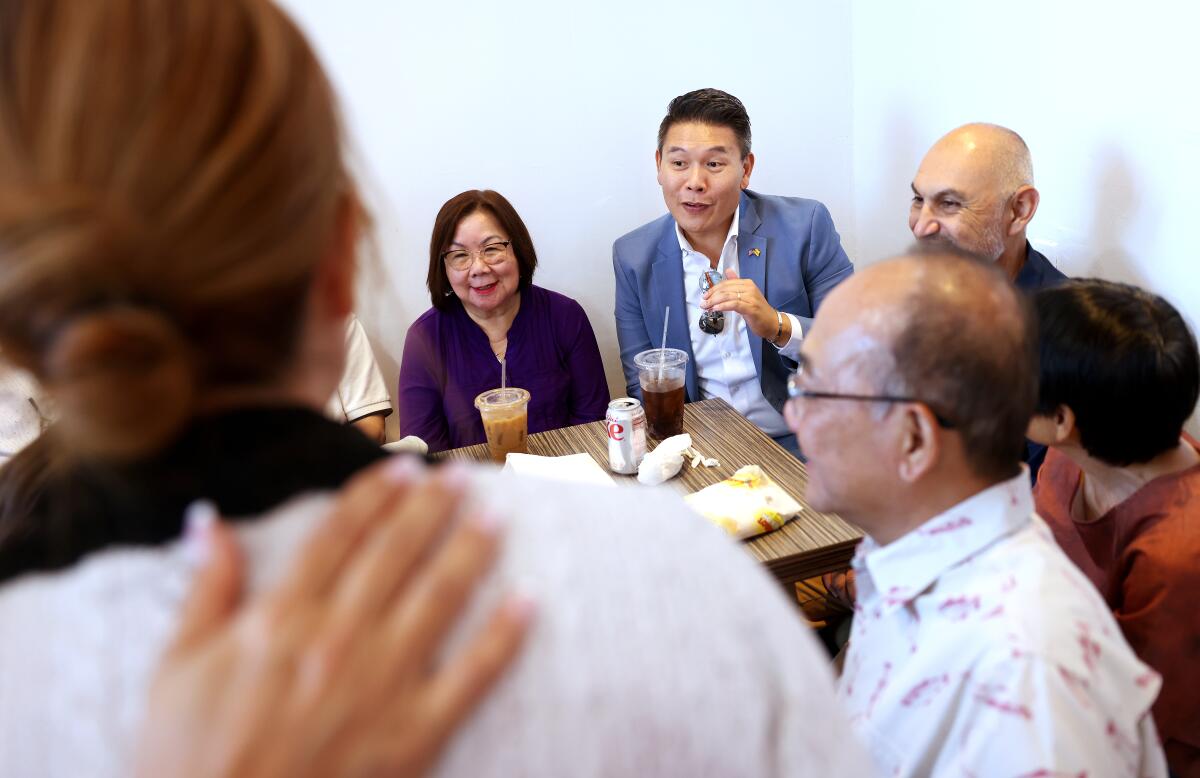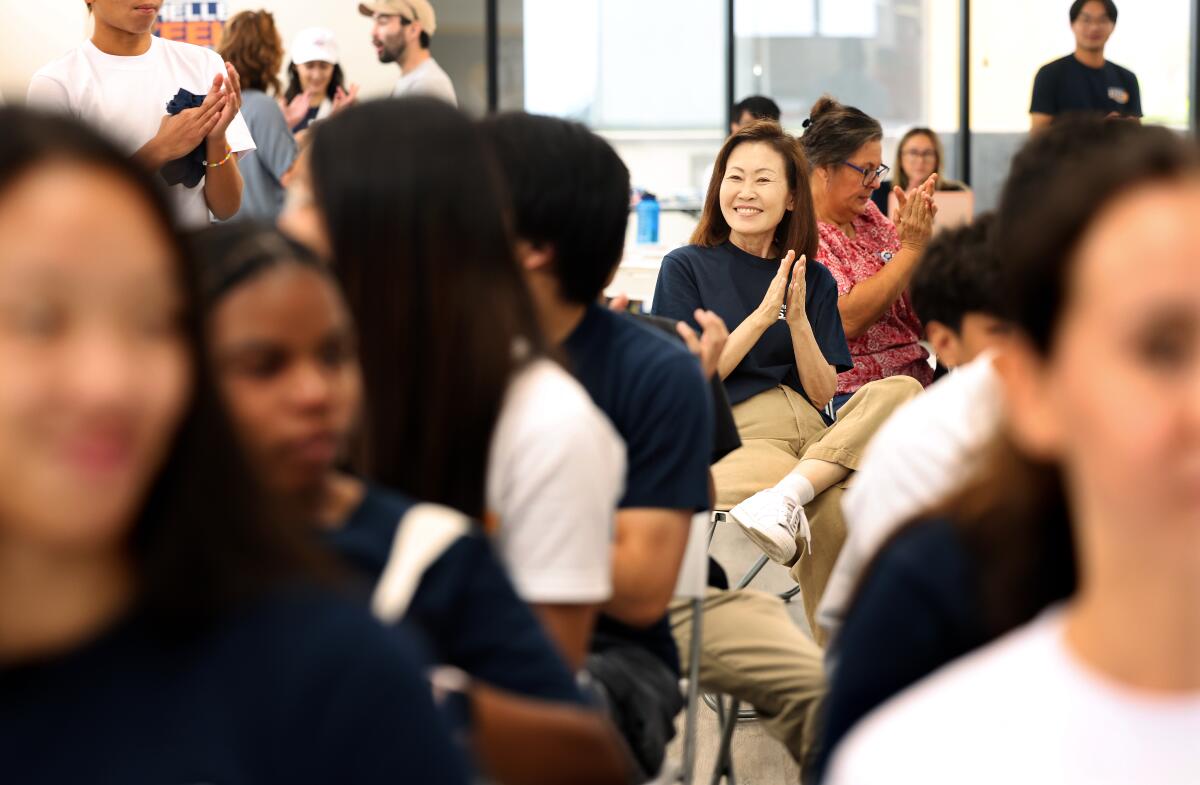Will a Vietnamese American candidate help Democrats win a congressional seat in Little Saigon?

- Share via
At a solemn reunion in Orange County, dozens of elderly Vietnamese Americans gathered recently to reconnect with others once held at Suối Máu, a camp where dissidents and American allies were imprisoned after the fall of Saigon.
In the sea of gray hair and faded army uniforms, one younger face stood out: 43-year-old Derek Tran, a Democrat running for Congress.
The 45th Congressional District has the largest population of people of Vietnamese descent outside of Vietnam, but has never had a Vietnamese American representative in Washington.
Democrats hope Tran can buck that trend. To beat Republican Rep. Michelle Steel, 69, a formidable fundraiser with deep ties to the Orange County GOP, Tran is pushing to win over Vietnamese voters, many of whom have been loyal Republicans since the 1980s.
The November contest is among a handful across the U.S. that both parties see as pivotal in determining control of the next Congress.
After the reunion of former political prisoners, Tran — who was born in the U.S. to Vietnamese refugees — said that in Congress he would “always remember our elders, who did so much for us.”
Tran, a lawyer, grew up in the San Gabriel Valley and moved to Orange County in 2012, where he and his wife opened a pharmacy in Anaheim. He serves on the board of the Consumer Attorneys Assn. of California and as a traffic commissioner for the city of Orange.
In the March primary, Tran defeated Garden Grove City Councilmember Kim Nguyen-Penaloza by 367 votes, finishing second behind Steel. He’s raised more than $2.2 million since entering the race in October 2023, and outraised Steel last quarter.
Tran said that his campaign has been buoyed by Vietnamese Americans who are thrilled to have a candidate who “can finally represent us.” He said some conservative voters have been swayed by his family’s story and his military service; he spent eight years in the U.S. Army Reserve, including a stint on active duty in 2003 on a homeland security detail at Georgia’s Ft. Stewart.
“There’s going to be MAGA, far-right Vietnamese Republicans that, you know, we’re not going to change their mind,” said Tran while driving between campaign stops. “But I have Trump supporters who are going to vote down-ballot Democrat for me.” He said he’d been told by older Vietnamese American voters that “in the 30-plus years that we’ve been here in this country, we’ve never voted for a Democrat — you’re the first one we voted for.”
Vietnamese voters, and Asian voters more broadly, are “an essential part of the path to victory in this district,” said Sarah Lin, who works on Asian American outreach and mobilization for the Democratic Congressional Campaign Committee.
Tran faces stiff competition from Steel, a two-term incumbent who received almost 55% of the vote in the primary. Born to South Korean parents and raised in Japan, Steel broke barriers in 2020 when she became one of three Korean American women elected to the House.
Steel campaign officials have questioned whether Tran can win a significant percentage of Vietnamese voters, saying their own analysis of primary precinct data showed Steel received more votes in the most Vietnamese-heavy areas of the district than Tran and Nguyen-Penaloza combined.
One-third of the district’s voters are Asian American, and half of those are of Vietnamese descent.
Whom voters support is far more complex than shared ethnic identity or family history, Steel’s campaign and Republicans backing her candidacy have argued. To address the broken U.S. economy, they say, voters will go with Steel, the candidate they know and trust.
Vietnamese American voters in particular “need to know the person in the office,” said state Assemblymember Tri Ta (R-Westminster), who was the first Vietnamese mayor of Westminster, home to Little Saigon. He said Steel would be reelected “big time” because she “has been in the community for more than 20 years.”
Before Steel was in Congress, she represented the area for more than a decade on the Orange County Board of Supervisors and on the Board of Equalization, the state panel that oversees taxation. Steel is married to Shawn Steel, the former chairman of the California Republican Party. She said the couple has worked for years to help elect Vietnamese American Republicans in California.

This is the first presidential election in which Orange County’s Vietnamese community has been mostly in the same congressional district. That was an intentional decision by California’s independent redistricting commission, said Sara Sadhwani, an assistant professor of politics at Pomona College who served on the panel as a Democrat.
Sadhwani said she expects Steel to have the classic incumbency advantage, particularly given the Vietnamese community’s record of supporting the Republican Party. But, she said, “there’s a younger generation of Vietnamese Americans who are less enchanted by what the Republican Party has become.”
As for Tran’s chances, Sadhwani said, there are exceptions, but research generally shows that across most racial groups in America, “ethnicity and the shared identity between candidates and voters does tend to matter.”
In 2022, Steel’s congressional campaign faced criticism over advertisements that painted her Taiwanese American opponent Jay Chen as a tool of communist China.
Steel speaks frequently about the threat of communism and has also brought attention to the treatment of political prisoners by the Vietnamese government. But, she said, her campaign is focusing on kitchen-table issues, because that’s what she hears about from voters: “Inflation, gas prices ... and especially in California, crime.”
At Steel’s election headquarters in a multistory outdoor mall in Buena Park, dozens of volunteers gathered early one overcast Saturday for coffee, mochi donuts and a refresher on voter outreach.
The campaign said it has focused heavily on its ground game, making more than 250,000 phone calls this year and knocking on more than 100,000 doors. Steel has raised nearly $6.3 million, including $910,000 in personal loans, and now has more than $4 million on hand, a war chest three times Tran’s. A successful House campaign in the expensive Southern California media market can cost north of $5 million.
Democrats hold a registration advantage of 4.3 percentage points in the 45th District, but the gap has narrowed slightly in the last two years as Republicans have pushed to register more voters, according to the California secretary of state.
The district, which is plurality Asian, is one of the few majority-minority districts in Congress not represented by a Democrat. Most precincts in Westminster and Garden Grove supported Hillary Clinton for president in 2016. Since then, the area has swung right. In 2020, and again in this year’s primary, they mostly went for former President Trump, voter data shows.
As he stepped out of a pharmacy in Westminster, Republican Andy Pham said he planned to vote for Steel. He said his top issue is the rising cost of everything, and he likes Steel’s campaign signs, which read: “Stop inflation, lower taxes.”
Steel’s signs in Vietnamese have a different message: “Đả đảo cộng sản,” which translates to, “Down with communism.”
“That’s the right message,” Pham said. He said he liked the idea of a congressional candidate who comes from a refugee family, but said he had never heard of Tran before the election and is generally skeptical of Democrats.
Over a lunch of pork belly banh mi and sugarcane juice in Westminster, Garden Grove resident Jackie Conley, who fled Vietnam as a teenager, said that seeing the child of refugees running for Congress has given her hope.
It wasn’t a given that she would vote for Tran, she said, but she works in healthcare and likes his focus on making medical care more affordable. Getting her family to vote for Tran, she said, has been another story: “Half of them are Republicans, and that is hard to change.”
Neither candidate lives in the district; Tran lives in Orange, and Steel lives in Seal Beach.
Tran has criticized Steel as being too “extreme” for Orange County, pointing to her questioning of mask mandates during the COVID-19 pandemic and her decision to co-sponsor an antiabortion bill in Congress. (Steel removed her name from the bill two months after signing it, saying she did not want her support to be construed as a lack of support for in vitro fertilization.)
Republicans have called Tran, who has never held elected office, too inexperienced for Congress. They’ve also said that, while the Democratic Party has described Tran as fluent in Vietnamese, he uses an interpreter and speaks English in interviews with Vietnamese media.
About 7% of voters in the district receive ballots printed in Vietnamese, according to the research firm Political Data Inc.
Tran said Vietnamese was his first language, but he has lost his childhood fluency. He understands most of what’s said to him, he said, but uses a translator “because I don’t want any of my messaging to get lost from my broken Vietnamese.”
Vietnamese elders, Tran said, have told him that they appreciate that he is making an effort.
More to Read
Sign up for Essential California
The most important California stories and recommendations in your inbox every morning.
You may occasionally receive promotional content from the Los Angeles Times.














